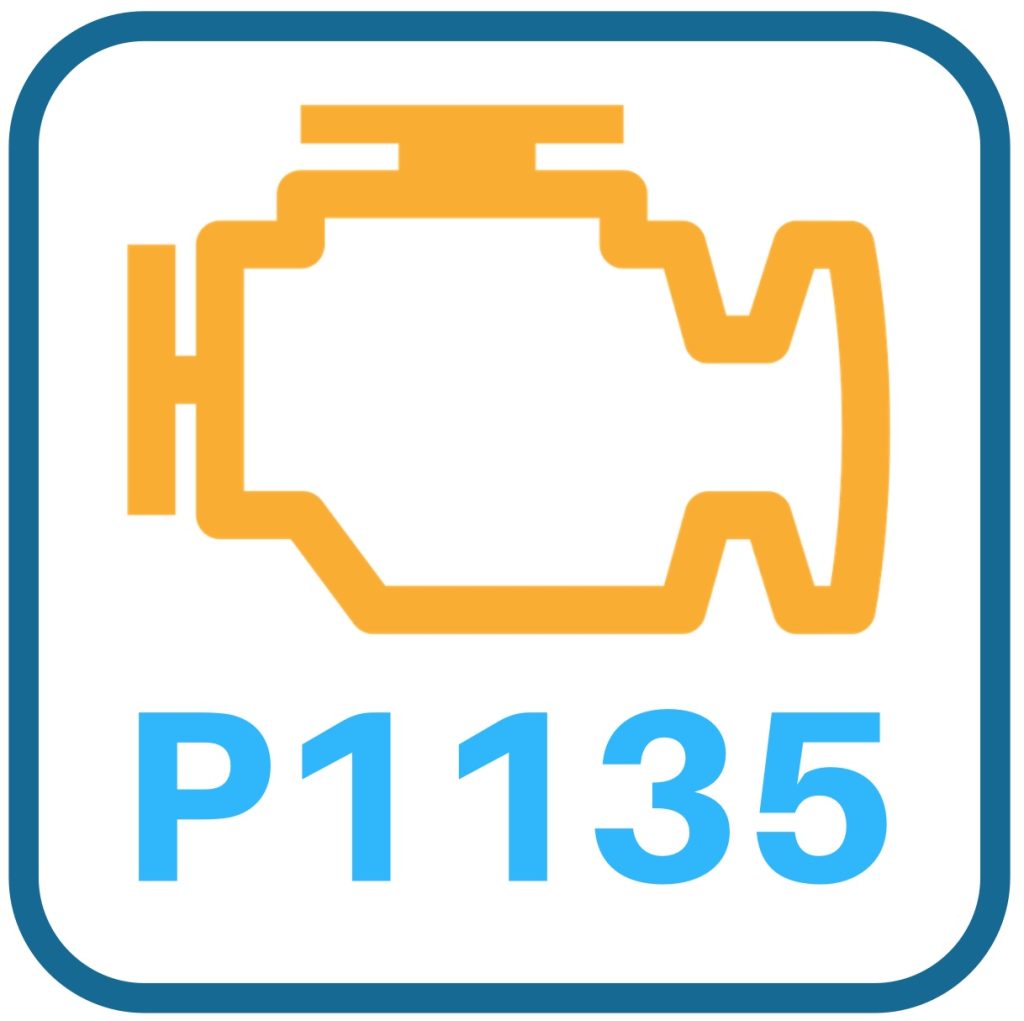P1135 is a manufacturer-specific trouble code, which means that different automakers can assign it whatever definition they see fit.
It indicates that the heated Oxygen sensor at bank 1 sensor 1 has a heater element that is not responding. The most common fix for P1135 is a new A/F sensor.
This article only applies to Toyota-built vehicles (Toyota, Lexus, Scion). If you have any other type of vehicle, this article does not apply to it.
P1135 Definition: A/F Sensor Heater Circuit – Repsonse – B1S1

Here’s the definition of P1135 broken down by its two main parts:
A/F Sensor Heater Circuit
The A/F sensor is responsible for measuring the oxygen content of the exhaust. The PCM uses this data to adjust the air-fuel mixture to the optimal 14.7 parts air to 1 part fuel.
The PCM can turn on the heated element to raise the temperature of the A/F sensor to get a more accurate reading.
Response
Response: Indicates that PCM is having an issue detecting a response from the heated oxygen sensor circuit. The service engine soon light will come on, and P1135 is stored in the PCM’s memory.
Bank One, Sensor One (B1S1)
Bank one is the part of your engine with the first cylinder. You only need to concern yourself with this if there is more than one cylinder head.
If there is more than one cylinder head, you’ll need to determine which bank is number one.
Bank one is the side of the engine with the first cylinder. On Toyota’s with front-wheel drive, that is usually the side of the engine closer to the radiator.
If you have a V8, bank one should be the cylinder head that is facing a little more forward than the other.
Sensor one is easier to identify. Start from bank one and follow the exhaust. It’s the first one. It’ll likely be on the exhaust manifold or collector.
P1135 Symptoms
Here are the most common symptoms associated with P1135:
- Rough running engine
- Smell of gas
- Hard to start
P1135 Causes & Diagnosis

Here are the most common causes of P1135 and a pretty good order of operations for diagnosing it.
1. Check the Wiring on Bank 1 Sensor 1
Since the PCM is not getting a response from the A/F sensor, check the wiring harness for damage.
First, inspect the harness going to the A/F sensor. Pay extra close attention to where the harness may have come into contact or rubbed something. Look for burnt or damaged wiring. This is a VERY COMMON cause for P1135.
Take at where it plugs in and see if there has been any damage to the pins. If they appear corroded, get some electrical contact cleaner and clean them up. If they are damaged, you will need to repin or replace your wiring harness.
2. Bad Oxygen Sensor – Swap Test
If your Toyota happens to be a V6 or V8 model, you can do the “swap test.” This involves clearing the codes and seeing if the code “jumps” to bank 2.
Here’s how the swap test is done:
- Clear the DTC codes with your scanner.
- Swap the Bank 2 Sensor 1 O2 sensor with the Bank 1 Sensor 1. It’ll be on or right after the exhaust manifold.
- Run the engine until the check engine light comes back on.
- If the code changes to a new code on the Bank 2 side, that’s proof enough you need to replace the oxygen sensor syou swapped.
- If the code remains P1135, you’ll need to continue pursuing your diagnosis, knowing that both O2 sensors are working fine.
3. Bad Oxygen Sensor – Capture the Short/Long Term Fuel Trim Values
If you happen to have access to a scan tool, you can use it to capture the short and long-term fuel trim values. You’ll need to make sure that the engine is warmed up before you do this.
Doing this will help you determine if the O2 sensor is operating within spec without looking under the hood. Compare the values that you captured with your tool with the values the manufacturer specifies.
While this isn’t a skill most DIY mechanics have, the concept is simple, and you can learn enough to use fuel trim to your advantage by watching this 11-minute video (it’s worth it).
4. Not Likely – Bad ECM
It’s not very likely that a bad ECM caused P1135 in your Toyota, but it can happen. We recommend taking it to a shop before attempting to replace it.
Conclusion
P1135 is most likely caused by a bad A/F sensor. Good luck repairing your vehicle.
